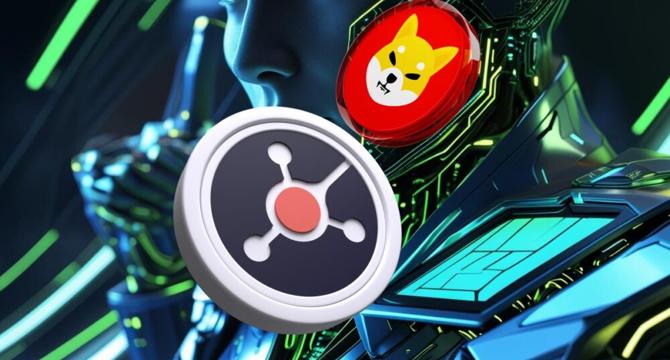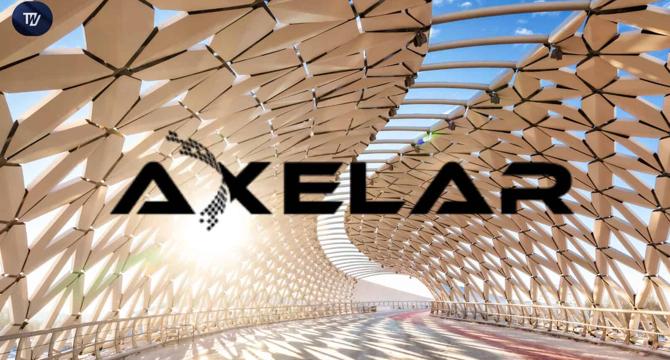Blockchain News
TechBullion
1d
116

Image Credit: TechBullion
Why Analysts Favor Ruvi AI (RUVI) Over Shiba Inu (SHIB)? Passed Audit Could Push It to $1 Sooner Than Expected
- Ruvi AI (RUVI), a project blending AI with utility, is gaining favor over Shiba Inu (SHIB) due to structured growth strategy and investor protections.
- The project's successful third-party audit by CyberScope enhances transparency and security, while a partnership with WEEX Exchange ensures liquidity post-presale.
- Ruvi AI's strong presale performance, priced at $0.015 per token in Phase 2 and expected to reach $1 post-listing, appeals to investors seeking trustworthy projects.
- Unlike Shiba Inu, Ruvi AI focuses on solving real-world problems with AI-based marketing tools, secure payment systems, and fraud detection algorithms, offering structured investment tiers for early backers.
Read Full Article
7 Likes
Massivelyop
1d
302

Reaper Actual confirms extraction shooter gameplay as John Smedley defends the blockchain
- Reaper Actual, a persistent war MMO or PvPvE shooter, introduces extraction shooter elements like bringing materials from the battlefield to owned bases.
- The gameplay involves owning multiple bases, defending them from attacks, and raiding other players' bases, with a heat mechanic affecting raiding opportunities.
- Distinct Possibility Studios CEO John Smedley discussed integrating blockchain in the game, allowing player-created item marketplace without crypto elements in the core game.
- The game plans include MMO-like crafting, modding support, console releases, and supporting up to 200 players initially, with potential for more players in the future.
Read Full Article
18 Likes
Medium
1d
369

Image Credit: Medium
Record Growth Fuels Next Phase For Revolving Games — Games Publishing, IP Deals & Player Expansion
- Revolving Games is experiencing record-breaking momentum across its game portfolio and is entering the next phase of growth driven by player adoption, product-first development, and a growing global community.
- The company's latest title, War of Nova, has become one of the fastest-growing strategy games, while HatchKings, a social slots game, set a new on-chain gaming revenue record.
- Revolving Games is focusing on building a scalable, player-first publishing platform, aiming to reach $60 million in ARR by the end of the year, with upcoming game launches and a loyal player base investing in its ecosystem.
- Backed by industry giants, Revolving Games has demonstrated commercial success and rapid growth, emphasizing gameplay and community as key drivers for long-term success in the gaming industry.
Read Full Article
22 Likes
Massivelyop
1d
376

Jeffrey Butler’s crypto MMO Avalon arrives on Steam with a high fantasy focus (and no P2E)
- Jeffrey Butler's crypto MMO Avalon, developed by Danu Games, has arrived on Steam with a high fantasy focus inspired by King Arthur and the Knights Templar.
- The game offers solo and group exploration, PvE activities, raids, PvP arenas, crafting, gathering, an in-game economy, and dragon mount aerial PvP.
- Avalon is set to enter early access on Steam soon, with recent scenes from a closed alpha test in May and founder's packs already on sale.
- While the game opts out of metaversal crypto elements on Steam, Web3 pay-to-earn features might still be present elsewhere.
Read Full Article
22 Likes
Massivelyop
1d
23

Another blockchain MMO named Avalon arrives on Steam with a high fantasy focus
- A new blockchain MMO called Avalon, focused on high fantasy, has arrived on Steam, separate from another crypto MMO of the same name.
- The game draws inspiration from the legend of King Arthur and the Knights Templar, offering players a journey to earn a place among the Knights of the Round Table and uncover secrets within the Templar archives.
- Avalon features PvE activities, raids, PvP arenas, aerial PvP on dragon mounts, crafting, gathering, and an in-game economy. It aims to enter early access on Steam soon, allowing players to explore solo or in groups.
- Dev diaries and trailers showcase the game's world, housing system, PvP options, grinding zones, and updates. Interested players can follow the game's Steam page for updates and wishlist the game in the meantime, with a focus on Web3 pay-to-earn features off Steam.
Read Full Article
1 Like
TronWeekly
1d
330

Image Credit: TronWeekly
Axelar Bridges XRP and EVM Chains: $376K Moved In First Week
- Axelar has successfully onboarded XRP Ledger (XRPL) and XRPL EVM into its network, bringing the total number of connected blockchains to 81.
- In the first week, over 9,400 transactions worth $376,000 were processed between XRPL and other chains using Axelar GMP.
- Axelar GMP has facilitated $4.7 billion in volume and has attracted thousands of new addresses weekly, indicating growing demand for cross-chain asset transfers.
- The addition of XRP Ledger (XRPL) and XRPL EVM to Axelar's network enhances cross-chain interoperability, enabling users to move assets and interact with smart contracts seamlessly across different blockchain networks.
Read Full Article
19 Likes
Medium
2d
322

Image Credit: Medium
The ‘Digital Veneer’: Why Zillow Can’t Fix Real Estate’s Core Problem
- Zillow, a prominent Property Technology (PropTech) company, has transformed the real estate consumer experience with its data-driven approach and housing super app.
- While Zillow's Zestimate automated valuation model has been revolutionary, its reliance on unreliable data sources has led to significant inaccuracies, highlighting a fundamental issue in the real estate industry.
- The core problem in real estate lies in the lack of trustworthy foundational data, with on-market properties providing more accurate information compared to off-market ones.
- First-wave PropTech platforms like Zillow have improved user interfaces but have not addressed the foundational issue of unreliable data sources, indicating the need for innovation at a foundational level.
Read Full Article
19 Likes
Medium
2d
132

Image Credit: Medium
G Coin: Unleashing the Future of Web3 Gaming and Investment Potential
- G Coin is a cryptocurrency token with early adoption and growth potential, appealing to investors seeking long-term value.
- Aside from investment opportunities, G Coin functions as a key component in a Web3 gaming ecosystem, providing play-to-earn mechanics and real ownership of in-game assets.
- Built on the PlayBlock Layer-3 blockchain, G Coin boasts zero gas fees, scalability, and transparent on-chain logic, making it attractive to both gamers and investors.
- G Coin's innovative technology, seamless onboarding, and potential for value appreciation position it as a promising asset in the evolving Web3 industry, offering growth opportunities for those looking to invest in crypto and gaming.
Read Full Article
7 Likes
TheNewsCrypto
2d
120

PEPE vs. Ozak AI Price Forecast: Meme Surge or AI Strength—Where Will Gains Come From?
- Investors are analyzing the potential gains from meme coin PEPE and utility-driven token Ozak AI in the upcoming crypto market cycle.
- PEPE Coin, known for its meme appeal, is trading close to $0.00001, driven by social media hype and speculation rather than real-world utility.
- Ozak AI, an AI-powered crypto ecosystem focusing on predictive data analytics, is currently in its fourth presale stage at $0.005 per token, with solid interest from early adopters.
- While PEPE may offer short-term excitement, Ozak AI presents a structured, utility-driven growth opportunity backed by real innovation, making it a compelling choice for investors looking for calculated opportunities.
Read Full Article
7 Likes
TechBullion
2d
197

Image Credit: TechBullion
Which cloud mining platform can earn $8,000 a day? W·Mining integrates innovation and launches a new smart cloud mining APP
- W·Mining has launched a new intelligent cloud mining APP, offering a convenient and efficient mining experience to global users.
- Traditional cloud mining requires significant upfront investment and maintenance, while smart cloud mining through W·Mining allows users to mine cryptocurrencies without purchasing equipment.
- W·Mining is a reputable cloud mining platform registered in 2021, focusing on security, sustainability, and using clean energy for environmentally friendly mining operations.
- Participants can join W·Mining easily in three steps, with various contract options available to suit different financial abilities.
Read Full Article
11 Likes
Medium
2d
1

$0x0: The Future of Privacy in DeFi is Here – And It's About to Make You Rich!
- $0x0 is a DeFi project offering 100% revenue distribution to token holders, positioning itself at the intersection of privacy regulation, DeFi growth, and AI integration.
- Investors in $0x0 have received over 1,700 ETH in distributions with the potential for significant growth as more utilities go live on mainnet.
- Market predictions suggest $0x0 could reach $0.8676 by 2027, with long-term projections exceeding $4.00 by 2040, highlighting its potential as a compelling investment opportunity.
- With revenue diversification, deflationary mechanics, competitive advantages, and market positioning in the privacy sector, $0x0 aims to lead the privacy revolution in the crypto space.
Read Full Article
Like
Coindoo
2d
331

Image Credit: Coindoo
Dubai Teams Up with Crypto.com to Digitize Real Estate Sector
- The Dubai Land Department (DLD) and Crypto.com have signed a Memorandum of Cooperation to integrate blockchain and digital assets into property transactions in Dubai.
- The partnership is part of the Dubai Real Estate Strategy 2033 to modernize the sector with technologies like blockchain, tokenization, and digital payments.
- Crypto.com will facilitate digital real estate transactions, offering solutions to tokenize properties, simplify buying/selling using cryptocurrency, and establish secure infrastructure for custody and settlements.
- Additionally, the Department of Finance will permit payment of government fees via cryptocurrencies, enabling users to convert crypto to AED through Crypto.com's exchange for settlement, streamlining payments for users.
Read Full Article
19 Likes
TechBullion
2d
218

Image Credit: TechBullion
3 Best Meme Coins to Join for Long Term: Arctic Pablo’s 1805% ROI Presale Ignites as Act I: The AI Prophecy and Cz’s Dog Climb
- Meme coins like Arctic Pablo, Act I, and Cz’s Dog challenge traditional cryptocurrencies.
- Arctic Pablo stands out with serious structure, unique presale, and community involvement.
- With a potential 1805% ROI and innovative staking program, it's a promising investment.
- Combining storytelling with AI and Binance nostalgia, these coins redefine the meme space.
Read Full Article
13 Likes
For uninterrupted reading, download the app